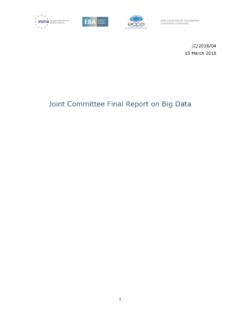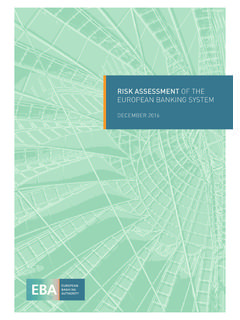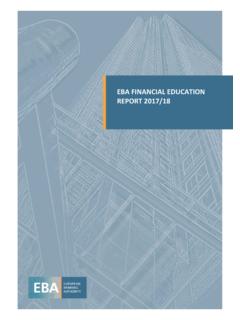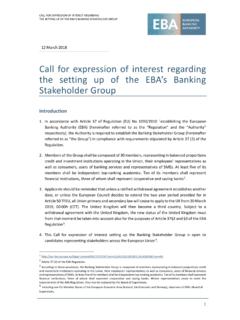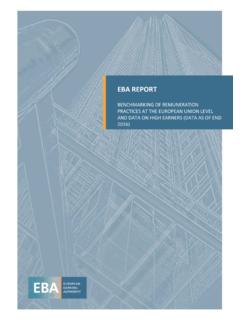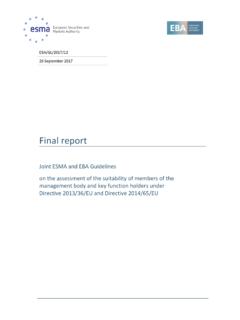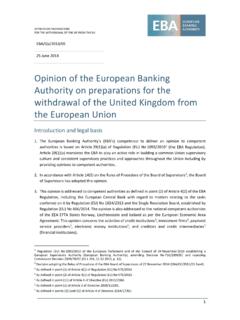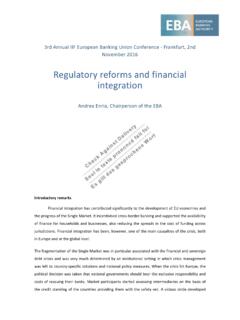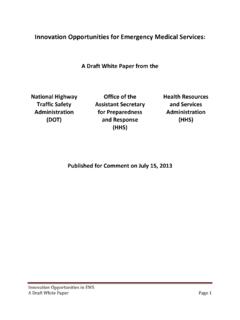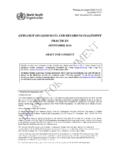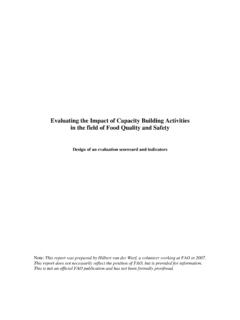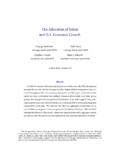Transcription of EBA/CP/2018/11 22/06/2018
1 EBA/CP/2018/11 . 22/06/2018 . Consultation paper EBA draft Guidelines on Outsourcing arrangements CONSULTATION paper ON GUIDELINES ON OUTSOURCING. Contents Responding to this consultation 4. draft Consultation paper on Guidelines on Outsourcing 15. 1. Compliance and reporting obligations 16. 2. Subject matter, scope and definitions 17. Subject matter 17. Addressees 17. Scope of application 18. Definitions 18. 3. Implementation 19. Date of application 19. Transitional provisions 20. Repeal 20. 4. Guidelines on Outsourcing 20. Title I Proportionality and group application 20. 1 Proportionality 20. 2 Outsourcing within group application and institutional protection scheme 21.
2 Title II Outsourcing arrangements 22. Title III Governance framework 24. 3 Governance requirements 24. 4 Outsourcing Policy 26. 5 Conflicts of interest 28. 6 Business continuity plans 29. 7 Internal audit function 29. 8 Documentation requirements 30. Title IV Outsourcing process 32. 9 Pre outsourcing analysis 32. Assessment of the criticality or importance 33. Due diligence 34. Risk assessment of outsourcing arrangements 35. 10 Contractual phase 37. Sub-outsourcing of critical or important functions 39. Security of data and system 40. Access, information and audit rights 40. Termination rights 42. 2.
3 CONSULTATION paper ON GUIDELINES ON OUTSOURCING. 11 Oversight of outsourced functions 43. 12 Exit strategies 44. 13 Duty to adequately inform supervisors 45. Title V Guidelines on outsourcing addressed to competent authorities 46. Annex 1 Documentation of outsourcing 49. 5. Accompanying documents 50. draft cost-benefit analysis / impact assessment 50. Overview of questions for consultation 61. 3. CONSULTATION paper ON GUIDELINES ON OUTSOURCING. Responding to this consultation The EBA invites comments on all proposals put forward in this paper and in particular on the specific questions summarised in Comments are most helpful if they: respond to the question stated.
4 Indicate the specific point to which a comment relates;. contain a clear rationale;. provide evidence to support the views expressed/ rationale proposed; and describe any alternative regulatory choices the EBA should consider. Submission of responses To submit your comments, click on the send your comments' button on the consultation page by Please note that comments submitted after this deadline, or submitted via other means may not be processed. Publication of responses Please clearly indicate in the consultation form if you wish your comments to be disclosed or to be treated as confidential. A confidential response may be requested from us in accordance with the EBA's rules on public access to documents.
5 We may consult you if we receive such a request. Any decision we make not to disclose the response is reviewable by the EBA's Board of Appeal and the European Ombudsman. Data protection The protection of individuals with regard to the processing of personal data by the EBA is based on Regulation (EC) N 45/2001 of the European Parliament and of the Council of 18 December 2000 as implemented by the EBA in its implementing rules adopted by its Management Board. Further information on data protection can be found under the Legal notice section of the EBA website. 4. CONSULTATION paper ON GUIDELINES ON OUTSOURCING.
6 Executive Summary Trust in the reliability of the financial system is crucial for its proper functioning and a prerequisite if it is to contribute to the economy as a whole. Consequently, effective internal governance arrangements are fundamental if institutions individually and the financial system they form are to operate well. Over recent years, there has been an increasing interest of financial institutions to outsource business activities in order to reduce costs and improve their flexibility and efficiency. In a context of digitalisation and increasing importance of new financial technology (fintech) providers, financial institutions are adapting their business models to embrace such technologies.
7 Some have increased the use of fintech solutions and have launched respective projects to improve their cost efficiency as the intermediation margins from the traditional banking business model are put under pressure by the low interest rate environment. Outsourcing is a way to get relatively easy access to new technologies and to achieve economies of scale. Directive 2013/36/EU (CRD) strengthens the governance requirements for institutions and its Article 74 (3) mandates the EBA to develop Guidelines on their governance arrangements. Outsourcing is one of the specific aspects of institutions governance arrangements.
8 Directive 2014/65 (MiFID) and Directive 2015/2366/EU (PSD2) contain explicit provisions regarding outsourcing by investment firms and payment institutions. The EBA is updating the CEBS guidelines on outsourcing issued in 2006 that applied only to credit institutions, in order to establish a more harmonised framework for all financial institutions that are within the scope of EBA's mandate, namely credit institutions and investment firms subject to CRD, payment and electronic money institutions. The guidelines set out specific provisions for these financial institutions' governance framework with regard to their outsourcing arrangements and the respective supervisory expectations and processes.
9 The recommendation on outsourcing to cloud service providers, published in December 2017, has been integrated in the guidelines. The financial institution's management body remains responsible at all times; to this end the management body should ensure that sufficient resources are available that appropriately support and ensure the performance of those responsibilities, including to oversee the risks and to manage the outsourcing arrangements. Outsourcing must not lead to a situation where an institution becomes a so called empty shell that lacks the substance to remain authorised. With regard to outsourcing to services providers located in third countries, financial institutions must take particular care that compliance with EU legislations and regulatory requirements ( professional secrecy, access to information and data, protection of personal data) are ensured and that the competent authority is able to effectively supervise financial institutions, including, in particular the critical or important functions outsourced to service providers.
10 5. CONSULTATION paper ON GUIDELINES ON OUTSOURCING. The guidelines define which arrangements with third parties are considered as outsourcing and provide criteria for the identification of critical or important functions, which have a stronger impact on the financial institution's risk profile or on its internal control framework. If such critical or important functions are outsourced, stricter and stronger requirements apply as compared to other outsourcing arrangements. Competent authorities are required to effectively supervise financial institutions' outsourcing arrangements, including the identification and monitoring of risk concentration at single service providers and to assess whether or not these could pose a risk to the stability of the financial system.

